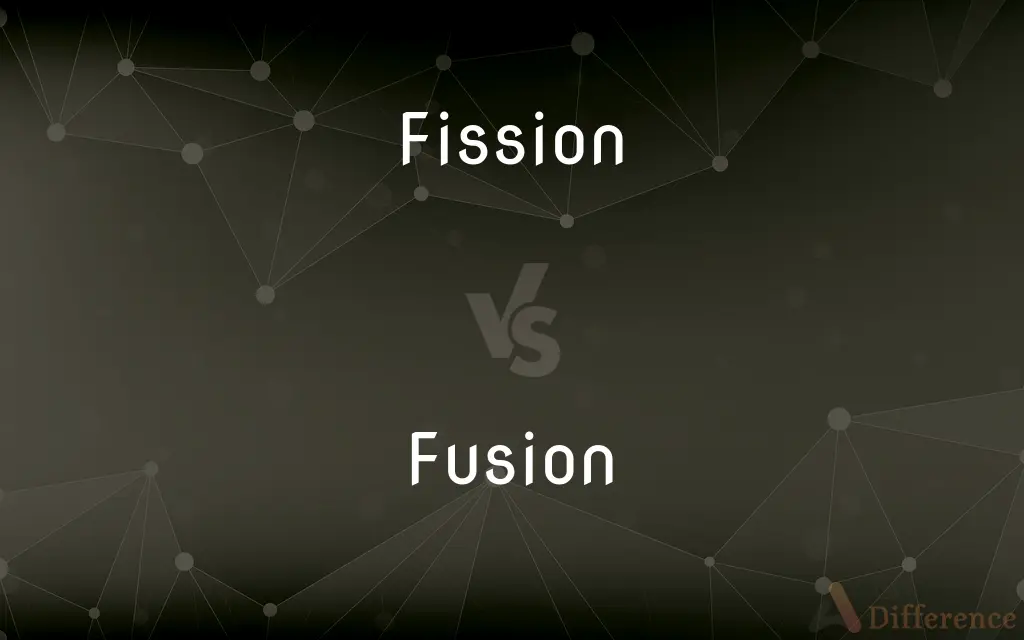Fission vs. Fusion — What's the Difference?
By Fiza Rafique & Urooj Arif — Updated on March 20, 2024
Fission and fusion are nuclear reactions that release energy, with fission splitting heavy atomic nuclei and fusion combining light ones, each with distinct applications and challenges.

Difference Between Fission and Fusion
Table of Contents
ADVERTISEMENT
Key Differences
Fission is a nuclear reaction in which a heavy atomic nucleus splits into smaller, lighter nuclei, releasing a significant amount of energy. Fusion, on the other hand, involves combining two light atomic nuclei, such as those of hydrogen isotopes (deuterium and tritium), to form a heavier nucleus, typically helium. This reaction occurs at extremely high temperatures and pressures, similar to conditions found in the sun and stars, and releases even more energy than fission.
This process of fission is utilized in nuclear reactors to produce electricity. The process also releases additional neutrons, potentially triggering a chain reaction that can be controlled in a nuclear reactor to generate power or uncontrolled in the case of a nuclear weapon. Fusion has the potential for cleaner and virtually limitless energy, as it produces less radioactive waste and uses abundant fuels.
Fission reactions are initiated by bombarding a heavy nucleus, like uranium or plutonium, with a neutron, causing it to become unstable and split. However, achieving and sustaining the conditions for fusion on Earth has been a significant scientific and engineering challenge, and it is not yet a viable commercial energy source.
While fission is a mature technology used worldwide for electricity generation, offering a powerful energy source with the challenges of radioactive waste and safety risks, fusion represents a promising future technology with the potential for abundant, clean energy, awaiting breakthroughs in overcoming its technical hurdles.
Comparison Chart
Reaction Type
Splitting of heavy atomic nuclei into smaller ones
Combining light atomic nuclei into a heavier one
ADVERTISEMENT
Energy Released
Significant, but less than fusion
Greater than fission
Conditions
Can occur at relatively low temperatures and pressures
Requires extremely high temperatures and pressures
Applications
Nuclear reactors, atomic bombs
Potential for clean and limitless power generation
Current Status
Commercially used worldwide
Experimental and not yet commercially viable
Key Challenges
Radioactive waste, safety risks
Achieving and maintaining the necessary conditions for reaction
Example Nuclei
Uranium, Plutonium
Hydrogen isotopes (Deuterium, Tritium)
Environmental Impact
Radioactive waste
Minimal radioactive waste
Fuel Abundance
Limited by uranium/plutonium reserves
Abundant in hydrogen isotopes
Compare with Definitions
Fission
Splitting of atoms.
Nuclear fission of uranium powers many electricity plants.
Fusion
Experimental technology.
Fusion energy remains experimental, with ongoing research.
Fission
Radioactive waste.
Fission produces radioactive waste that requires careful disposal.
Fusion
Merging of atoms.
Fusion of hydrogen isotopes releases vast amounts of energy.
Fission
Atomic bombs.
The explosive power of atomic bombs comes from uncontrolled fission.
Fusion
High temperature requirement.
Fusion requires temperatures of millions of degrees.
Fission
Chain reaction.
A controlled fission reaction in a reactor generates heat for electricity.
Fusion
Sun's power source.
The sun generates its energy through nuclear fusion.
Fission
Nuclear reactors.
Fission occurs in the core of nuclear reactors to produce energy.
Fusion
Clean energy potential.
Fusion is pursued for its potential as a clean energy source.
Fission
The act or process of splitting into parts.
Fusion
The act or procedure of liquefying or melting by the application of heat.
Fission
A nuclear reaction in which an atomic nucleus, especially a heavy nucleus, such as an isotope of uranium, splits into fragments, usually two fragments of comparable but unequal mass along with a few neutrons, releasing energy in the order of magnitude of 100 million electron volts. Nuclear fission may occur spontaneously or may be induced by the absorption of a neutron, which can initiate a nuclear chain reaction.
Fusion
The liquid or melted state induced by heat.
Fission
To cause (an atom) to undergo fission.
Fusion
The merging of different elements into a union
The fusion of copper and zinc to form brass.
The difficult fusion of conflicting political factions.
Fission
To undergo fission.
Fusion
A union resulting from fusing
A fusion of religion and politics emerged.
Fission
The process whereby one item splits to become two.
Fusion
(Physics) A nuclear reaction in which atomic nuclei combine to form more massive nuclei with the simultaneous release of energy.
Fission
(nuclear physics) nodot=a: The process of splitting the nucleus of an atom into smaller particles.
Fusion
Music that blends jazz elements and the heavy repetitive rhythms of rock. Also called jazz-fusion, jazz-rock.
Fission
(biology) The process by which a bacterium splits to form two daughter cells.
Fusion
A style of cooking that combines ingredients and techniques from very different cultures or countries.
Fission
(transitive) To cause to undergo fission.
Fusion
The act of merging separate elements, or the result thereof.
Fission
(intransitive) To undergo fission.
Fusion
(physics) A nuclear reaction in which nuclei combine to form more massive nuclei with the concomitant release of energy. Category:en:Nuclear physics
Fission
A cleaving, splitting, or breaking up into parts.
Fusion
(music) A style of music that blends disparate genres; especially different types of jazz and reggae.
Fission
A process by which certain coral polyps, echinoderms, annelids, etc., spontaneously subdivide, each individual thus forming two or more new ones. See Strobilation.
Fusion
A style of cooking that combines ingredients and techniques from different countries or cultures
Fission
The act or process of disintegration of an atomic nucleus into two or more smaller pieces; called also nuclear fission. The process may be spontaneous or induced by capture of neutrons or other smaller nuclei, and usually proceeds with evolution of energy.
Fusion
The act of melting or liquefying something by heating it.
Fission
A nuclear reaction in which a massive nucleus splits into smaller nuclei with the simultaneous release of energy
Fusion
(genetics) The result of the hybridation of two genes which originally coded for separate proteins.
Fission
Reproduction of some unicellular organisms by division of the cell into two more or less equal parts
Fusion
(cytology) The process by which two distinct lipid bilayers merge their hydrophobic core, resulting in one interconnected structure.
Fusion
(fiction) The act of two characters merging into one, typically more powerful, being; or the merged being itself.
Fusion
(nonstandard) to combine; to fuse
Fusion
The act or operation of melting or rendering fluid by heat; the act of melting together; as, the fusion of metals.
Fusion
The state of being melted or dissolved by heat; a state of fluidity or flowing in consequence of heat; as, metals in fusion.
Fusion
The union or blending together of things, as, melted together.
The universal fusion of races, languages, and customs . . . had produced a corresponding fusion of creeds.
Fusion
The union, or binding together, of adjacent parts or tissues.
Fusion
An occurrence that involves the production of a union
Fusion
A nuclear reaction in which nuclei combine to form more massive nuclei with the simultaneous release of energy
Fusion
The state of being combined into one body
Fusion
The merging of adjacent sounds or syllables or words
Fusion
The combining of images from the two eyes to form a single visual percept
Fusion
Correction of an unstable part of the spine by joining two or more vertebrae; usually done surgically but sometimes done by traction or immobilization
Fusion
The act of fusing (or melting) together
Common Curiosities
Why is fusion considered cleaner than fission?
Fusion produces less long-lived radioactive waste compared to fission.
Why is fission currently more practical than fusion for energy production?
Fission technology is well-developed and can operate under much less extreme conditions than fusion, making it commercially viable today.
What are the main environmental concerns with fission reactors?
The disposal of radioactive waste and the risk of accidents releasing radioactive materials.
Can fusion reactors experience a meltdown like fission reactors?
No, fusion reactions cannot sustain themselves without continuous input of energy, making a meltdown scenario unlikely.
What fuels fusion reactions in stars?
Stars, including the sun, fuse hydrogen into helium, releasing energy that lights and warms Earth.
What makes fusion energy challenging to harness?
Achieving and maintaining the extreme temperatures and pressures required for fusion is technically challenging.
Can fusion power be used for military purposes like fission?
The primary focus of fusion research is for energy production, and it does not inherently lend itself to weaponization like fission.
What is the role of magnetic fields in fusion reactors?
Magnetic fields are used in some fusion reactor designs to confine the hot plasma and maintain the conditions for fusion.
How does the energy output of fusion compare to fission?
Fusion releases more energy per unit of fuel than fission.
Is there any successful fusion reactor?
While there have been successful experiments in achieving fusion reactions, there are no commercial fusion reactors in operation yet.
How do fission and fusion reactions contribute to carbon emissions?
Neither fission nor fusion directly produces carbon emissions, but their environmental impacts vary significantly.
What advancements are needed for fusion to become a viable energy source?
Breakthroughs in sustaining fusion reactions efficiently and economically are required for it to become viable.
What are the geopolitical implications of developing fusion energy?
Fusion energy could significantly alter global energy markets and dependencies, potentially leading to shifts in geopolitical power.
Why do fusion reactions require such high temperatures?
High temperatures are needed to overcome the electrostatic repulsion between positively charged nuclei for fusion to occur.
How long has fusion been pursued as an energy source?
Fusion has been researched as a potential energy source for over half a century.
Share Your Discovery

Previous Comparison
Unlike vs. Dislike
Next Comparison
Lorry vs. TruckAuthor Spotlight
Written by
Fiza RafiqueFiza Rafique is a skilled content writer at AskDifference.com, where she meticulously refines and enhances written pieces. Drawing from her vast editorial expertise, Fiza ensures clarity, accuracy, and precision in every article. Passionate about language, she continually seeks to elevate the quality of content for readers worldwide.
Co-written by
Urooj ArifUrooj is a skilled content writer at Ask Difference, known for her exceptional ability to simplify complex topics into engaging and informative content. With a passion for research and a flair for clear, concise writing, she consistently delivers articles that resonate with our diverse audience.















































